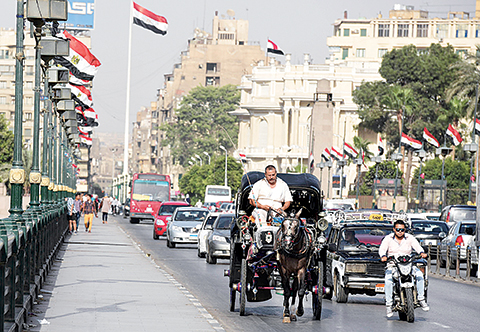 A general view shows different forms of transport on a road in Cairo, on August 10, 2015 as soaring temperatures and humidity hit the Egyptian capital and other parts of the country. Twenty-one people have died and 66 others were hospitalised with exhaustion due to the rise in temperature. AFP PHOTO / MOHAMED EL-SHAHED
A general view shows different forms of transport on a road in Cairo, on August 10, 2015 as soaring temperatures and humidity hit the Egyptian capital and other parts of the country. Twenty-one people have died and 66 others were hospitalised with exhaustion due to the rise in temperature. AFP PHOTO / MOHAMED EL-SHAHEDCAIRO: Twenty-one people have died and 66 others were hospitalised with exhaustion as soaring temperatures and high humidity hit Cairo and other parts of Egypt, the health ministry said yesterday. The victims, who all died on Sunday, succumbed as temperatures reached highs of 47 degrees Celsius, in conditions made less bearable by elevated humidity levels. Fifteen people died in Cairo, four in the western province of Marsa Matruh and two in Upper Egypt's Qena province, the ministry said in a statement. Those who died, including seven women, were all aged over 60.
Sixty-six people were admitted to hospital after suffering from exhaustion, including 37 who are still under observation, it added. "There is a big rise in temperature compared with previous years. But the problem is the humidity which is affecting people more," said ministry spokesman Hossam Abdel Ghaffar. "Long exposure under the sun is a killer."
Meteorological officials confirmed that temperatures in the capital and some parts of the country were higher than average. "The temperature is higher by four to five degrees than what is usually seen, and the humidity is very high this month," Waheed Soudi, head of analysis in the Egyptian Meteorological Authority told AFP. "The peak temperature in the shade was 38 degrees Celsius in Cairo on Sunday, which means it was 47 degrees under the sun or in places with bad ventilation."
Yesterday, the temperature touched 37 degrees Celsius by late morning, with state media reporting that the heatwave was expected to last until the middle of August. Although it is not uncommon to see summer temperatures in the high 30s throughout Egypt, it is rare for humidity levels to remain elevated during excessively hot weather.
Separately, three policemen were wounded yesterday when a bomb exploded under a traffic sentry post near a Cairo court, security sources said, the latest in a series of attacks to hit the Egyptian capital. Bomb disposal experts defused a second device they found inside a black bag while searching the area following the blast, state news agency MENA said. Egyptian authorities have pledged to end a wave of Islamist militant violence that has swept across the country, but sporadic attacks on high-profile locations in the city and elsewhere have continued.
The explosion, which occurred in the affluent northeastern Heliopolis district, was claimed on Twitter by Ajnad Misr, a militant group that emerged in January 2014 and has targeted security forces in and around Cairo. "God Almighty made it possible for a company of our heroes to target a gathering of criminal security forces in the vicinity of Heliopolis Court with a bomb that led to the serious injury of two of their senior officers ... and a conscript," the group's media wing said on Twitter.
A two-year insurgency centred on the Sinai Peninsula has killed hundreds of soldiers and police since the army ousted President Mohamed Morsi after mass protests against his rule in 2013. Sinai Province, which has pledged allegiance to the militant Islamic State movement that has taken over swathes of Iraq and Syria, is the most active group.
The violence is undermining efforts by the Egyptian government to revive investment and foreign tourism crucial to the economy and stability of the Arab world's most populous country. While the insurgency is concentrated in the Peninsula, which lies between Israel, Gaza and the Suez Canal, violence has also hit the capital. Egypt's top public prosecutor was killed by a car bomb attack on his convoy in late June, the most senior state official to die at the hands of militants in two years. Attacks have also targeted some of Egypt's tourism sites, including the Karnak temple in Luxor.
Meanwhile yesterday, a court referred 10 people to Grand Mufti Shawqi Allam, Egypt's most senior religious authority, a step required by law for convictions in capital cases, in a trial involving the brother of Al-Qaeda leader Ayman Al-Zawahiri. Mohammad Al-Zawahiri was not amongst those referred to the mufti, meaning he escaped the death penalty in this case, judicial sources said. He and 67 others are accused of forming a terrorist organization with relations to Al Qaeda and targeting state institutions, the military, police, and Coptic Christians. The court will issue a verdict on Sept 27. - Agencies










